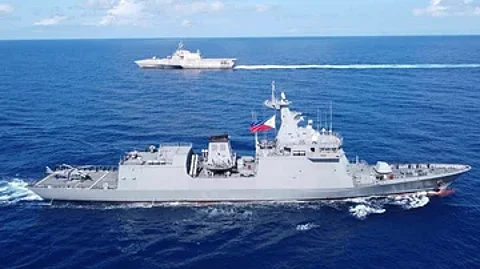

A LOCAL chief executive in Palawan province whose fishermen have been affected by the overlapping territorial claims in the South China Sea is appealing to the Philippine government to lead in finding a multilateral peaceful resolution to the issue among China and other claimant countries.
Appearing on the public affairs television show The Way Forward on Wednesday (Jan. 3), Rizal town Mayor Norman S. Ong told program host lawyer-journalist Karen Jimeno it is time for the Philippines to again convince the various countries with claims in the South China Sea to talk among themselves on a multilateral level to achieve peace, stability, and development in the conflict area.
“Actually, apektado po talaga ‘yung aming mga fishermen. Before kasi, malaya o sabi nga ay walang pumipigil sa kanila doon sa West Philippine Sea. So, kaya ngayon, limited na lang ‘yung area or fishing ground na napupuntahan nila. ‘Yung talagang nandun ‘yung presensya ng mga Chinese, hindi na sila doon pumupunta,” Mayor Ong said.
“Mas maganda talaga na instead na mag-agawan, why not magkaroon ng agreement among countries at ilatag nila kung ano ‘yung gusto nila? Ilatag halimbawa ng Vietnam, ilatag ng China, the Philippines, and other countries doon sa area ang kanilang mga baraha. And then, mag-come up sa isang magandang solusyon,” he added.
Aside from the Philippines and China, which is claiming the entire South China Sea of which the WPS is a part of, other countries involved are Malaysia, Vietnam, Taiwan (Republic of China), and Brunei Darrusalam.
In 2016, the Permanent Court of Arbitration (PCA) in The Hague, Netherlands, ruled that China's claims to the historic rights, or other sovereign rights or jurisdiction, within its nine-dash line were contrary to the United Nations Convention on the Law of the Sea (UNCLOS) and that China had violated the Philippines' sovereign rights in its exclusive economic zone (EEZ). It is not, however, recognized by China.
“Before this conflict with China arose, ang senaryo (doon) is walang pakialamanan at respetuhan. The scenario was one of non-interference, a sort of mutual respect,” Ong recalled.
He expressed hope that under the administration of President Ferdinand Marcos, Jr., there will be significant improvement as to the easing of tension in the WPS. After all, China and the Philippines, Ong pointed out, have been trading partners for hundreds of years.
“Hopefully si China medyo magising-gising din. Kasi kung babalikan natin talaga ‘yung history, the Chinese and the Filipino people are trading partners sa napakatagal na panahon,” he said.
In the same program, Mayor Ong found an ally in leading environmentalist and former World Wide Fund (WWF)-Philippines executive director and vice president Romeo Trono, who advocated that claimant countries need to be talking and collaborating, not just for regional peace and stability, but in terms of taking care of the environment and biodiversity conservation.
He also said the Philippines should view the issue as connected to the country’s national security.
“This issue needs to be addressed by a broad range of stakeholders and government agencies, including non-government organizations. Yes, it is a threat to our security, but I would like to slant it as food security,” Trono said.
He explained: “If you look at the previous studies in the South China Sea on connectivity of marine ecosystems, these countries are actually interconnected. There are countries that are sources of larvae. There are countries that are sinks. So, if you do something bad in one area, it will definitely impact the other side.”
Meanwhile, Philippine Climate Change Commission (CCC) Vice Chairman and Commissioner Robert Borje called for the full development of the blue economy as part of the government’s overall approach in mitigating the ill effects of climate change.
“The principles of the blue economy are for sustainability and the development would be critical for us, not just for climate change but also for disaster risk reduction,” Borje said, noting that Filipinos should learn to manage the country’s ocean resources in a sustainable manner.
“We should use it and utilize it in a way that our future generations will be able to also profit from the resources that the oceans have,” he said.
The government, Borje stressed, should look after the fishery sector which remains to have the highest poverty incidences among the Basic Sectors.
“The fishery sector, as it is, contributes about 1.3% of our Gross Domestic Product (GDP). It is important to get our private sector on board because we would want our fishery sector to be part of a value chain where the value chain is not just profit-oriented, but also takes into consideration the socioeconomic development of the most vulnerable sector,” he said.
Another guest, Undersecretary Rosemarie Edillon from the National Development Policy and Planning at the National Economic and Development Authority (NEDA) revealed that the support to the fishing industry and the development of the Blue Economy is included in the updated Philippine Development Plan (PDP).
“Practically half of our local government units (LGUs) actually have a coast. And so, under the PDP, we want to see these LGUs integrate what we call an ocean area management plan or fisheries area management plan into their own local development plans,” she concluded. PR